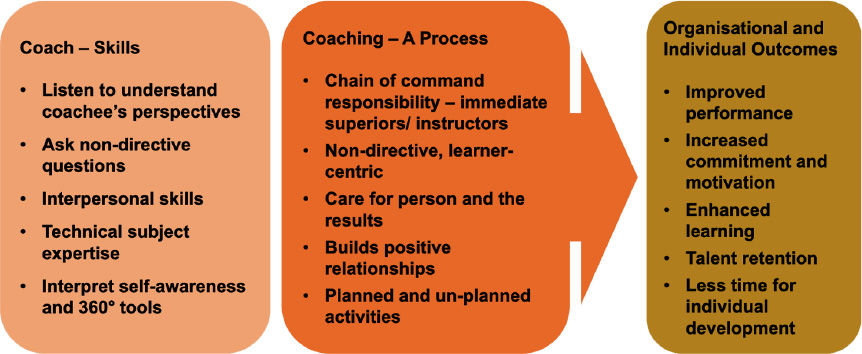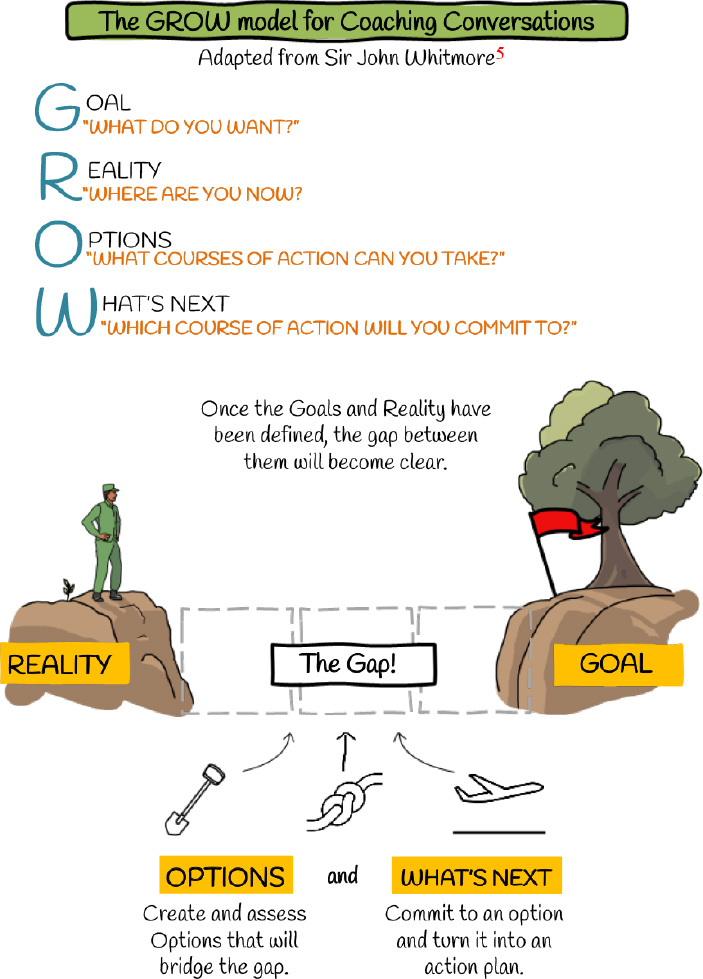Coaching is a responsibility of the chain of command to improve performance (skills) and learning, and to build the commitment of their subordinates. It is a process that is focused on the development of subordinates, to help them learn from their experiences which can then be translated into effective new actions for their present and future roles.
Coaching is intended to extend the repertoire of our leaders' conversation skills. Coaching will not replace giving orders. However, if you as a leader/ commander will only TELL, you will breed a new generation of leaders and soldiers who will only do and not think. The balance is key and the practice of coaching in your conversations is the key to unlocking your people's potential and enabling them to own their action plans.
Coaching is a fundamental responsibility that all leaders/ commanders must practise in order to trigger and support the development of thinking soldiers, engaged in more expansive and rigorous reflections. This serves to facilitate acceleration of learning from all activities, as well as increase ownership.
The purpose of coaching in the SAF is to build our organisational capability for effective learning at the individual and team levels to create a feedback culture through LD practices of reflection and journaling.
Coaching in the SAF24 is driven by the value we place on our people. The structures and systems such as individual development found in the IDP, and processes like the ALP, require SAF leaders to coach their subordinates in their work performance.
Coaching is one of the ways we can use to develop our subordinates. At times, we may need to mentor or counsel our subordinates, depending on the situation. Mentoring is usually advocated for career-related conversations where advice is given by the Commander to the subordinate. Counseling is advocated for problems or issues related to the subordinate in which the role of the Commander is to either guide and advise the subordinate or refer the subordinate to other relevant sources for help (in the case of need for clinical counseling).
By Coaching, you demonstrate care and commitment for the development of our people. It optimises learning from all training and operational experience. It facilitates the coachee's clarity of thinking for new insights and greater awareness in his/her learning cycle. While some interpersonal skills such as rapport building and active listening are acquired as part of Commander's development, the other specific coaching skills/ processes to be sharpened include non-directive questioning techniques for inquiry and feedback, as well as the GROW coaching model for coaching conversations.
The diagram below summarises the skills expected of you, the processes involved and the outcomes to be achieved by the individual and the organisation.

The model for engaging in a specific coaching conversation is called 'GROW'.
The key descriptions of the GROW model are:
Goal Setting
This is the stage in the conversation where you help the coachee set the goals that the latter wants to achieve as Outcomes.
Reality
The coachee makes an assessment of the current reality (what are the observations of the situation, performance or issue) within a given context.
Options
The coachee surfaces the possible options to achieve the goals set. With the coachee's permission, you may offer additional options for the coachee to consider.
What's Next
The coachee decides the way ahead for the action plan (with a specific timeline) to achieve the desired outcomes.

The GROW model provides a guide for conversation so that both you and the coachee can progressively arrive at an actionable conclusion. In using the GROW for coaching conversations, you need to support an open learning climate to facilitate the coachee to surface the issues and underlying assumptions for greater clarity of thinking. You will continue to challenge the coachee for self-discovery and expand the boundaries for options in order to build confidence and commitment to the developed action plan.
Through coaching, daily concrete experiences are translated into new knowledge and learning becomes effective. Coaching facilitates subordinates' self-discovery and unlocks their capabilities for accelerated learning. A coaching culture sensitises SAF leaders to reflect and act in more purposeful and proactive ways to develop subordinates. Coaching is also a strategy to enable the alignment of individual values and goals with that of the organisation's values and goals. It is clear that developing leaders through coaching is the key to unlocking the potential of our people in a 3G SAF.
Additional Resource(s) Here: